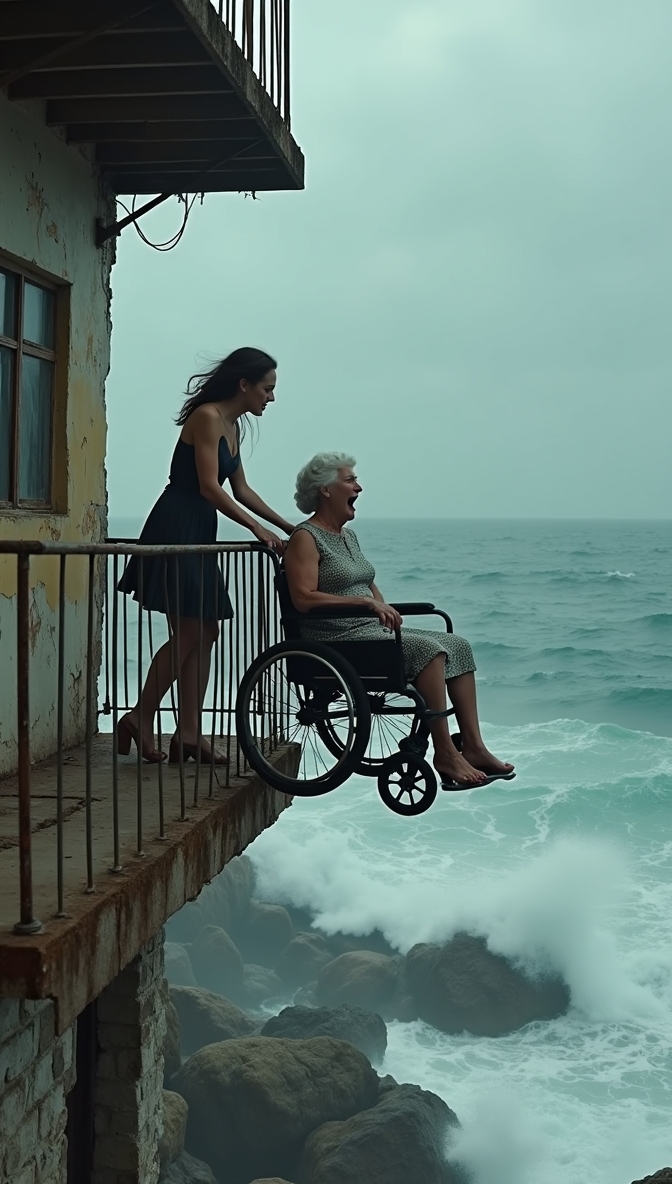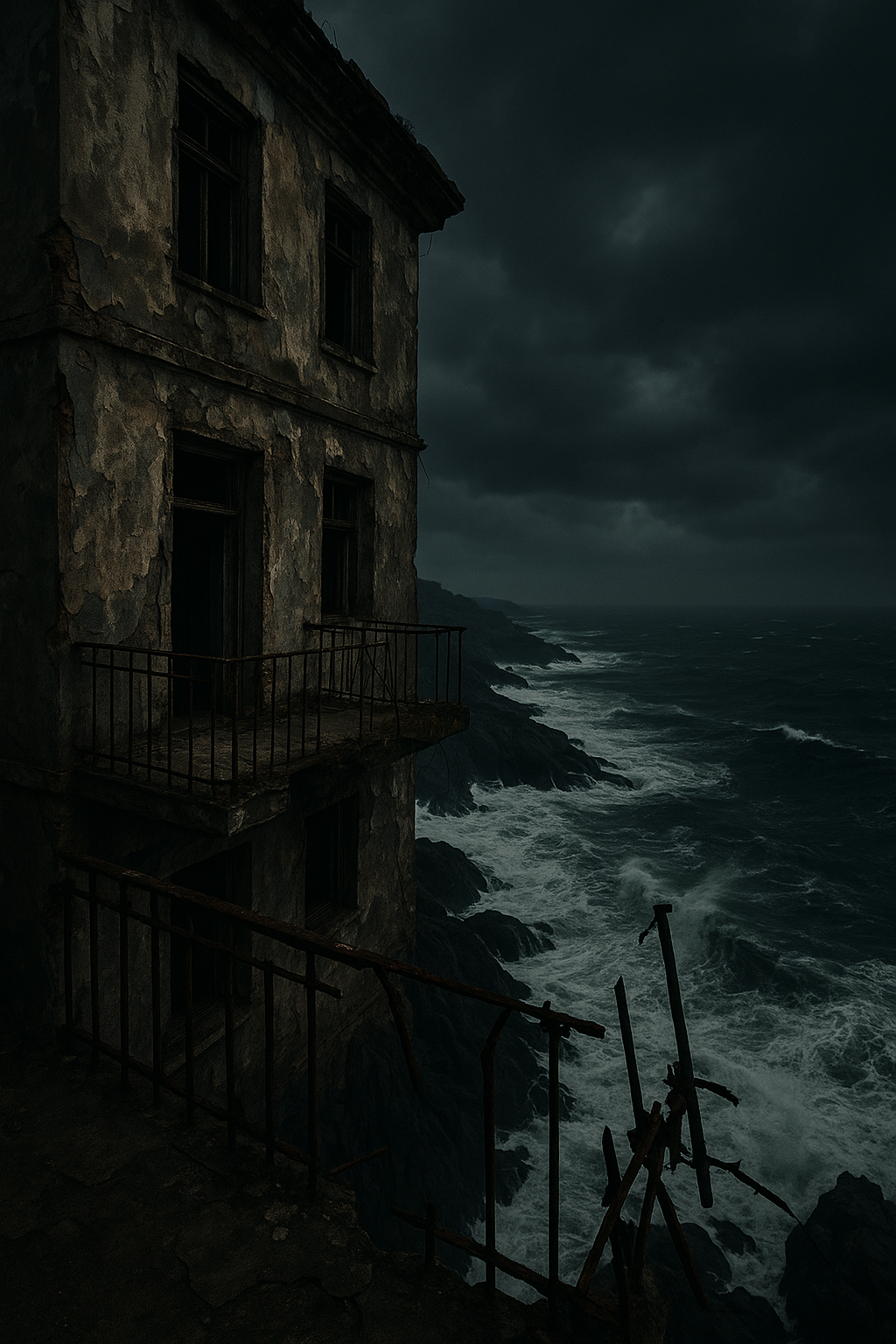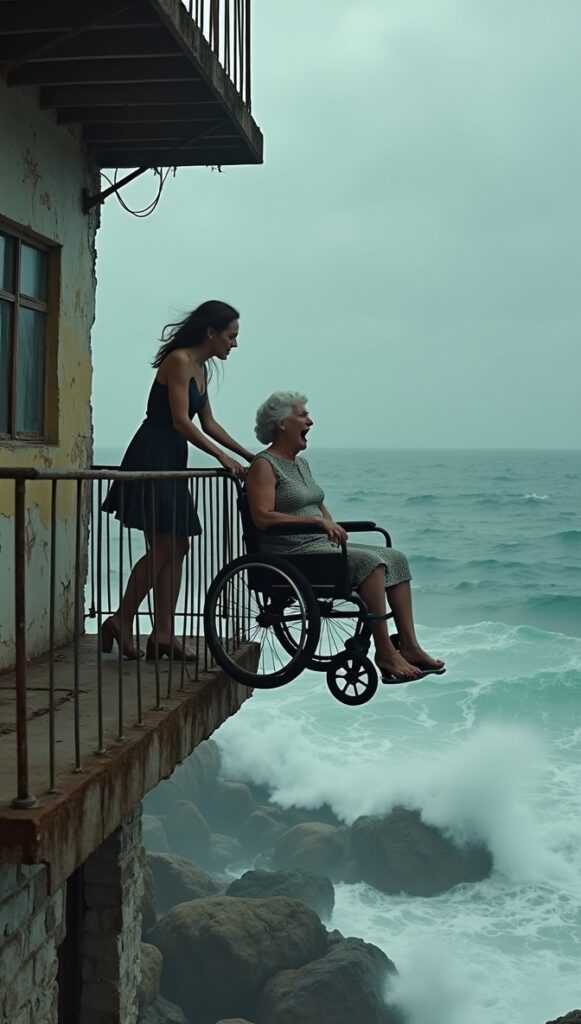The sky over Bar Harbor looked bruised, thick with thunderclouds. Wind rolled in from the Atlantic, bending the wild grass that edged the cliffs. Below, the waves crashed like cannon fire against the rock.
Inside the small coastal mansion at the end of Harbor Point Road, 68-year-old Eleanor Ward stared at the horizon from her wheelchair. Her late husband, Dr. Henry Ward, had always said this view reminded him of life itself—beautiful, dangerous, and untamed.
Now, she wondered if it would be the last thing she ever saw.
Behind her, she heard the slow, deliberate click of high heels on the wooden deck. “Beautiful day for fresh air, isn’t it?” said Vanessa, her daughter-in-law.
Eleanor turned slightly. Vanessa looked immaculate as always—navy coat, gloves, her blond hair tied back neatly. To anyone else, she was the perfect caretaker. To Eleanor, she was the storm itself.
“I didn’t ask to come outside,” Eleanor said quietly.
Vanessa smiled, her lips curling just slightly. “Oh, come now. The sea air’s good for you. And Henry loved bringing you out here, didn’t he?”
Eleanor’s fingers tightened on the armrest. She’d known for weeks that something was wrong. Her son, David, had trusted Vanessa implicitly after Henry’s death. But Eleanor saw what others didn’t—the false sweetness, the way Vanessa lingered near the liquor cabinet and the study safe.
She’d overheard snippets of conversations on the phone: “The old woman won’t make it through winter,” “Once the inheritance clears…”
Henry had warned her before he passed. “If you ever sense danger, Ellie, press the button under the right armrest. Don’t ask questions. Just trust me.”
She hadn’t understood why a retired engineer would install a hidden system in her wheelchair.
Now, she did.

The first shove came like a betrayal written in motion.
Eleanor barely had time to gasp before Vanessa’s gloved hands gripped the chair and pushed. The wheels spun on wet wood. The sound was swallowed by thunder.
Then—nothing but air.
The world tilted. Eleanor saw the horizon spin as the chair flew off the deck and over the cliff’s edge. Her scream vanished in the wind.
Rain hit her face as she plunged toward the sea. Her body jolted with the impact, pain radiating through her bones. Salt water filled her mouth. Her arms flailed, trying to move metal that was already dragging her down.
Then—Henry’s voice in her memory.
The button, Ellie. The right armrest.
Her trembling hand found it. She pressed.
A faint click. A whir. Then a hiss.
From beneath the seat, a compartment released compressed gas. Airbags inflated along the frame, turning the chair into a crude flotation device. A tiny red light began to blink.
Eleanor coughed and gasped for air as waves slammed against her. She was alive—barely. The cold tore at her, but she clung to consciousness. Above, she could see a lone silhouette at the cliff’s edge.
Vanessa.
She stood still for a moment, her coat snapping in the wind. Then she took out her phone and began to cry—loud, perfect sobs for an invisible audience.
“911,” Eleanor heard faintly. “Please—you have to help me! My mother-in-law—she rolled too close to the cliff—oh God—she fell!”
Eleanor’s fury burned hotter than the cold ever could. The waves carried her toward the cove below, where the rocks curved like sheltering arms. She hit the beacon again, and a small antenna extended from the chair’s frame. Somewhere inland, in a quiet police station, a light began to flash.
Detective Caleb Monroe had been halfway through a late shift when the signal came in.
“Code H-17 Beacon,” the radio crackled. “Registered to Dr. Henry Ward, deceased. Location: Harbor Point.”
Monroe frowned. He remembered Henry—the eccentric inventor who’d once built prosthetics for injured soldiers. And he remembered Henry’s widow, Eleanor, confined to a wheelchair after a car accident five years earlier.
He didn’t hesitate. The storm was raging, but he drove straight for the coast.
By the time he arrived, emergency vehicles already surrounded the Ward mansion. Vanessa sat on the porch, wrapped in a blanket, face streaked with rain and mascara. Her trembling voice carried over the wind.
“She just rolled too far. I tried to grab her—oh God, I couldn’t—”
“Mrs. Ward?” Monroe said, his tone steady. “When exactly did it happen?”
“Just twenty minutes ago,” she said, glancing at her watch too quickly. “I called immediately.”
Monroe nodded slowly. He noticed her gloves—still dry despite the rain. Odd.
Then his radio buzzed again.
“Dispatch to Detective Monroe. We’ve received a signal from the beacon. Victim alive. Coordinates transmitting now.”

Vanessa froze.
When they found Eleanor, she was clinging to the edge of a rock outcrop, her hair plastered to her face, the wheelchair half-sunk but still blinking.
Monroe himself helped pull her onto the rescue boat. She was shaking violently but conscious.
“Mrs. Ward,” he said gently. “Can you hear me?”
She coughed. “Yes.” Her eyes opened, burning with fury. “She pushed me. Vanessa pushed me.”
Monroe didn’t doubt her for a second.
The interrogation took place two hours later in the main room of the mansion. The storm had died down, but tension clung to the air like humidity. Vanessa sat on one side of the table, pale but defiant. “She’s confused,” she said smoothly. “She’s old, traumatized—she fell. That’s all.”
Eleanor sat opposite her, wrapped in a blanket, her wheelchair still dripping. Detective Monroe placed a small device on the table—a recording module Henry had built into the chair’s frame.
“Dr. Ward was a cautious man,” Monroe said. “He installed a lot of interesting technology in his wife’s equipment.”
He pressed play. Static. Then the sound of rain. And Vanessa’s voice, clear as a blade. “Goodbye, Eleanor. It’s better this way.”
Vanessa went rigid.
Eleanor met her eyes across the table. “Henry told me once,” she said softly, “that he could fix machines, but not people. I didn’t understand until I met you.”
Vanessa’s composure cracked. “You can’t prove—”
Monroe cut her off. “We already have. The beacon’s signal timestamp matches your call to 911. The audio seals it.”
Vanessa’s lips trembled. “You don’t understand—I needed that money—David was supposed to—” Her voice broke into sobs that no longer sounded rehearsed.
Months later, when the trial ended, Eleanor returned home to the cliffs. The estate was quiet again, filled with Henry’s inventions—strange, beautiful things that hummed faintly when touched.
She rolled into his old workshop, brushing dust off the blueprints pinned to the walls. In the corner, beneath a tarp, sat the prototype of his final project: The Guardian Series. Wheelchairs built with integrated AI sensors, designed to protect vulnerable users.
Henry had built safety into everything he loved. Even her.
Eleanor smiled faintly. “You clever fool,” she whispered. On his workbench lay a small cassette player labeled For Ellie. She pressed play.
Henry’s voice filled the room, warm and familiar: “If you’re hearing this, it means I couldn’t stay to protect you. But that doesn’t mean I didn’t try. Remember, Ellie—every storm ends, but not everyone builds a failsafe to survive one. You were mine.”
Tears blurred her vision. Outside, the sky cleared, streaked with gold.
Weeks later, Detective Monroe visited for one last report. Eleanor met him by the fireplace, sipping tea.
“You’re not the kind of woman who lets fear win, are you?” he said.
Eleanor smiled softly. “Fear wins only if you stop preparing for it.”
He hesitated, then added, “You know, the case report doesn’t do justice to what you endured.”
“I don’t need justice on paper,” she replied. “I have it in peace.”
Monroe nodded and left, closing the heavy oak door behind him.
Eleanor turned back toward the window. Far out at sea, she could still see the faint blinking of a buoy—a signal Henry had once built to mark safe waters. She’d had it restored after the trial. It blinked every night now, steady as a heartbeat. She reached out and touched the small silver button on her wheelchair again—not out of fear, but gratitude.
Henry had always believed love wasn’t about promises. It was about preparation. The wind brushed her hair as she whispered into the quiet, “You saved me twice, my love. Once with your heart. Once with your hands.”
The ocean roared softly in reply.And as the sun sank below the horizon, that tiny red light kept pulsing through the dusk— a reminder that even when love is gone, it can still answer when called. Maybe the real failsafe isn’t built from metal or code — maybe it’s the kind of love that plans ahead, even for the day you’re no longer there to protect the one you love.


